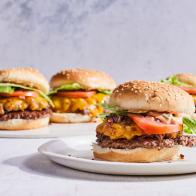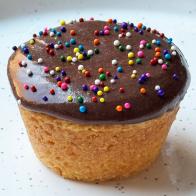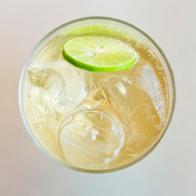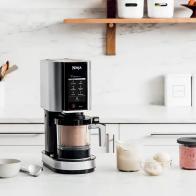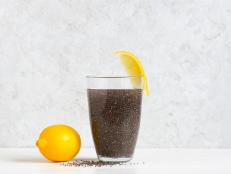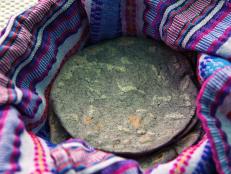Why You Might Want to Cut Back on Seltzer
Many of us drink unsweetened seltzer like it’s water, but that might be a mistake.

Oscar Wong/Getty
It’s been years since flavored seltzer burst onto the hydration scene, and now it’s easier than ever to find the stuff in pretty much any flavor you can dream of. And, for most of us, it’s easier to drink enough water every day when said water is bubbly and tastes like cherry blossom, or limoncello, or watermelon.
But despite the fact that flavored seltzer has no calories, sugar or artificial sweeteners, experts say that it’s not an exact substitute for regular old water. We’re not trying to sound any mega alarm bells — go ahead and keep sipping that can of pamplemousse without guilt! But if you see seltzer as an all-the-time replacement for water, it’s probably time to rethink how you drink it. Here’s what experts have to say about how flavored seltzer affects your body.
Can Seltzer Irritate Your Bladder and Kidneys?
A few months ago, pelvic floor physical therapist Alicia Jeffrey-Thomas, DPT, posted a video on TikTok about how seltzer water is a bladder irritant (meaning that it can make you pee more often), along with other drinks like coffee, tea and alcohol. As you can imagine, people went nuts at the suggestion that their beloved seltzer could be causing harm.
Luckily, urologists — doctors who specialize in the genitourinary tract, which is made up of the kidneys, bladder, adrenal glands, urethra and male reproductive organs — say that there’s nothing to worry about when it comes to seltzer water and bladder irritation unless you already have a sensitive or overactive bladder. Damon E. Davis, MD, a urologist with The Urology Specialists of Maryland at Mercy Medical Center in Baltimore, Maryland, says that in healthy people, seltzer water won’t impact these organs any differently than regular water would.
That said, it’s true that seltzer can be slightly more irritating to your bladder than regular water. It has carbon dioxide in it (that’s what makes it bubbly), which means it’s slightly acidic. And, if you have a sensitive bladder, that acid can irritate your stomach lining and make you feel the urge to pee more often. But this won’t cause any real damage to your bladder, so unless you feel like you’re constantly going to the bathroom and it’s bugging you (or if you have another bladder issue diagnosed by a medical professional), there’s no reason to limit seltzer consumption on your bladder’s behalf.
The same goes for your kidneys. “Seltzer water does not have any specific impact on kidneys compared to still water,” says Gregory Quayle, MD, a urologist and advisory board member to Phoenix, a Canadian men’s health website. It’s true that carbonated beverages like cola can negatively impact kidneys, but that’s not because of the bubbles. “Cola is proven to lead to urinary changes and kidney stones because of phosphoric acid, not because of carbonation,” Quayle says.
Technically, it’s possible to overhydrate yourself by drinking too much seltzer (or plain water). This very rarely happens in people with healthy kidneys, Quayle says, since the kidneys do a great job of eliminating excess fluid. But if you have a medical condition that decreases your body’s ability to excrete water or causes your body to retain water, overhydration is more of a risk. “Overhydration is a typical problem among those who have kidney issues, liver disease or prematurely born infants whose kidneys are still developing,” Quayle says.
Again, your risk of overhydration isn’t any greater with seltzer than with regular water, and it’s not something that most people have to worry about. But if your pee tends to be crystal clear all the time, that’s an early sign that you’re drinking too much water, including seltzer, Quayle says.
How Does Seltzer Impact Digestion?
As far as your gut goes, seltzer might actually be helpful. “Carbonated water can potentially help with dyspepsia (indigestion including pain, bloating and nausea in the upper abdomen) and constipation,” says Laura Manning, MPH, RD, clinical nutrition director at the Susan and Leonard Feinstein IBD Clinical Center at Mount Sinai Hospital in New York. This comes from a 2002 study published in the European Journal of Gastroenterology and Hepatology — since then, there hasn’t been much research done on the subject. “[This] may be related to the carbon dioxide helping to move stomach and colonic contents along quicker,” Manning says. “Carbonation may also help to stimulate gastric acid to help increase digestion of food in the stomach.”
That said, there’s definitely such a thing as too much seltzer. “A large intake of seltzer in a short period of time may cause gastric distress or bloating and can weaken a valve that typically keeps stomach contents down,” Manning says. This can exacerbate gastroesophageal reflux disease (GERD), because carbonation can cause belching, which can cause acid reflux and heartburn, Manning says.
If you’ve been diagnosed with GERD or experience heartburn regularly, you may want to cut out seltzer (and other carbonated drinks) to see if that helps. And if you’re drinking so much that you’re constantly bloated and burping, it’s time to cut back.
Does Seltzer Damage Your Teeth?
Although seltzer doesn’t contain any sugar — the main villain when it comes to teeth — some dentists believe that it might worth limiting your consumption.
Again, because seltzer is carbonated with carbon dioxide, it’s slightly more acidic than regular water. Pure water is neutral with a pH of 7, mineral water lands somewhere between a 5 and a 6, unflavored sparkling water like San Pellegrino and Perrier are around 5.25, and flavored seltzers like Bubbly and LaCroix are generally between 3.8 and 4.8, depending on the flavor. That means that seltzer is far less acidic than most other beverages — coke has a pH of 2.6-2.7, Sprite is about 3.3 and orange juice is about 3.5.
“Generally speaking, carbonation alone does not appear to damage the teeth, it’s the added ingredients that can contribute to the demineralization of teeth,” says Dr. Alex Rubinov, DDS, a cosmetic dentist based in New York City. Flavored seltzer sometimes contains added ingredients that are acidic, which means they’re more likely to cause tooth erosion than unflavored seltzers or plain water. But Rubinov says that it’s fine to drink them in moderation: “My rule of thumb would be one can a day with meals, and try to wash everything down with regular flat water at the end of the meal.” And if you’re drinking seltzer outside of meals, he still recommends rinsing your mouth with plain water afterwards, which can wash away any remaining acid.

Diana Miller/Getty
Is It Possible to Drink Too Much Seltzer?
The fact of the matter is that chugging seltzer water won’t have a huge negative impact on your overall health. Doctors aren’t concerned about the slight acidity of seltzer water impacting your organs, and unless you’re urinating constantly or noticing symptoms of overhydration, they say there’s no need to cut back.
But when it comes to dental health, seltzer’s slight acidity can add up over time. Rubinov recommends sticking to no more than one can of seltzer per day, and drinking it alongside a meal and some regular water to keep the acid from sticking to your teeth. But if you have good dental hygiene overall — regular brushing and flossing, and professional cleanings as recommended by your dentist — an extra can here or there probably won’t hurt.
Related Content:




